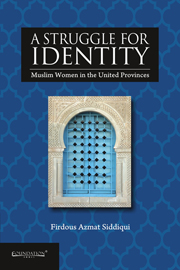Book contents
- Frontmatter
- Contents
- Acknowledgements
- Introduction
- 1 Social Stratification of Muslim Women in the United Provinces
- 2 Socio-religious Movement and the Muslim Women's Issue
- 3 British Perception of Muslim Women: Questions of Fecundity and Health
- 4 Crises in the Social and Economic Identity of Muslim Women: The Great Uprising of 1857
- 5 Changing Profile of Muslim Women through Education
- 6 Patriarchy and Social Obligation of Indian Muslim Women
- 7 Cultural Clash: From Tawaif to Kasbi
- 8 Law, Land and Muslim Women: The Economic Situation
- 9 Muslim Women's Response to the New Judicial System
- Conclusion
- Glossary
- Bibliography
- Index
9 - Muslim Women's Response to the New Judicial System
Published online by Cambridge University Press: 05 October 2014
- Frontmatter
- Contents
- Acknowledgements
- Introduction
- 1 Social Stratification of Muslim Women in the United Provinces
- 2 Socio-religious Movement and the Muslim Women's Issue
- 3 British Perception of Muslim Women: Questions of Fecundity and Health
- 4 Crises in the Social and Economic Identity of Muslim Women: The Great Uprising of 1857
- 5 Changing Profile of Muslim Women through Education
- 6 Patriarchy and Social Obligation of Indian Muslim Women
- 7 Cultural Clash: From Tawaif to Kasbi
- 8 Law, Land and Muslim Women: The Economic Situation
- 9 Muslim Women's Response to the New Judicial System
- Conclusion
- Glossary
- Bibliography
- Index
Summary
This chapter tries to understand and analyse the impact of the British judicial system on the rights of Indian Muslim women in the late nineteenth century. Examining the problems faced by Indian Muslim women, it looks at the positive and negative aspects of the British judicial system, as well as the response of the Muslim community to it. Bernard Cohn stated, ‘It cannot be denied that in India the laws that exist today grew out of a colonial legal system, with its bipolarity of authority and norms that derived from the indigenous and the colonial systems.’ This chapter will also focus on the development of the Indian legal system, and its impact on women.
Several of the problems that Indian Muslim women faced arose from the British perception of Indian Muslims. Taking all Muslims all over the world as one monolithic category, the British assumed that Indian Muslims were similar to those they had come in contact with in Europe and other Arab countries. They were unclear about who a Musalman really was. The British referred to Muslims as ‘Moors’ because of the language the latter used. The word ‘Moor’ was considered pidgin, or, as Gilchrist thought of it, as barbarian gabble. Another British fallacy was assuming that Indian Muslims could be understood from the Holy Books, and that religious dogmas were the Muslims' only concern.
- Type
- Chapter
- Information
- A Struggle for IdentityMuslim Women in United Provinces, pp. 197 - 218Publisher: Foundation BooksPrint publication year: 2014

